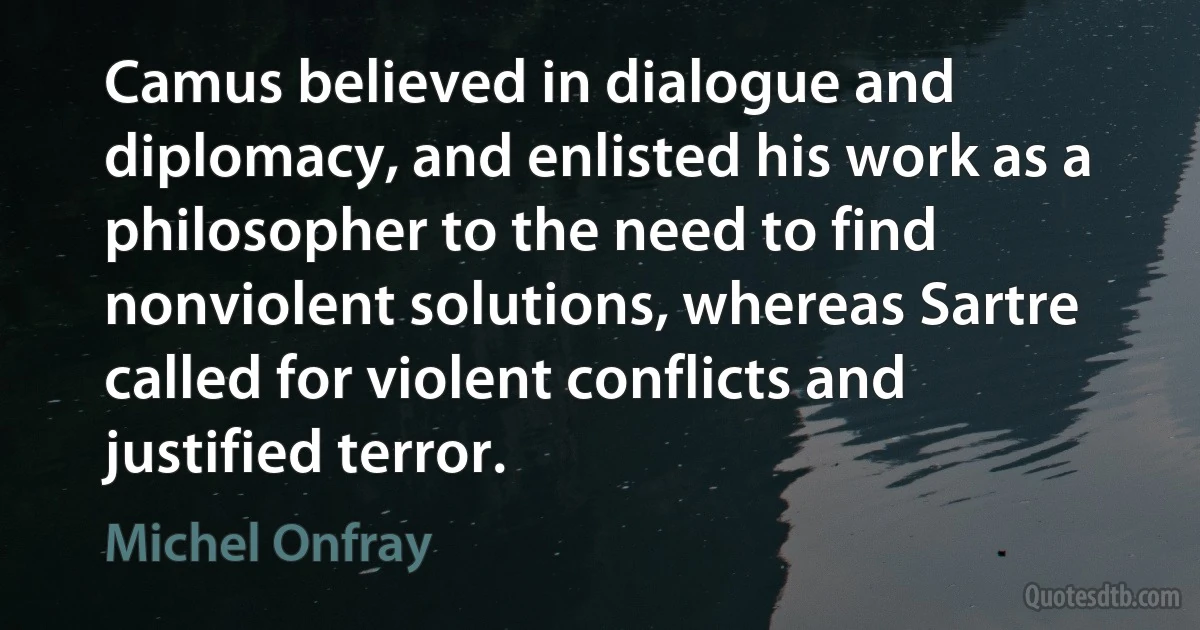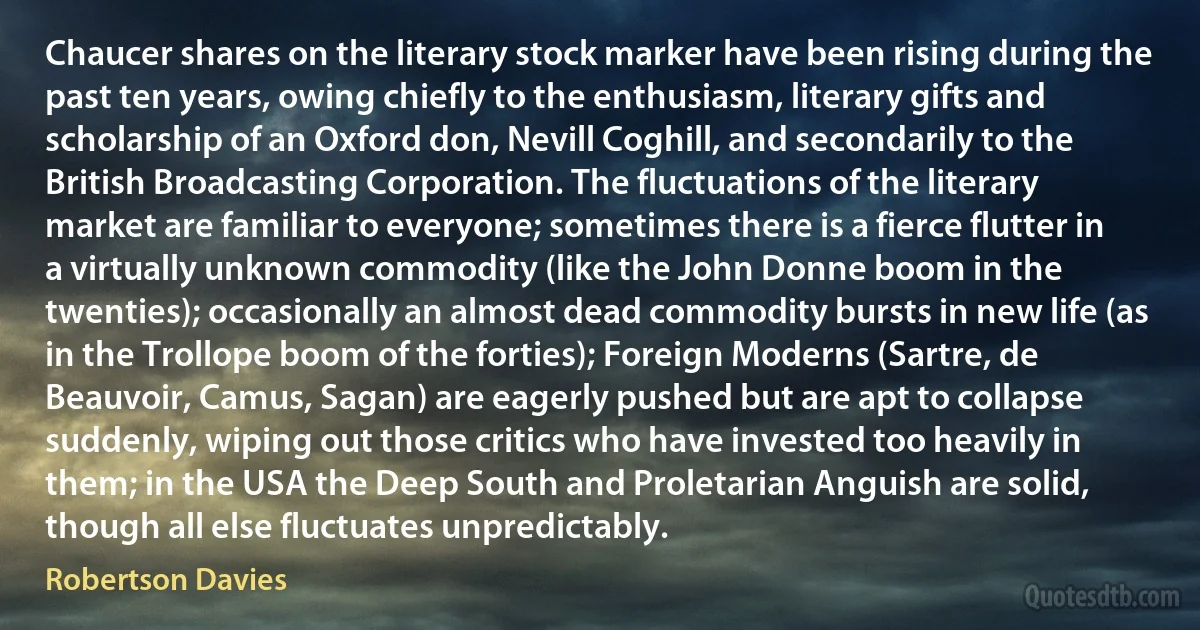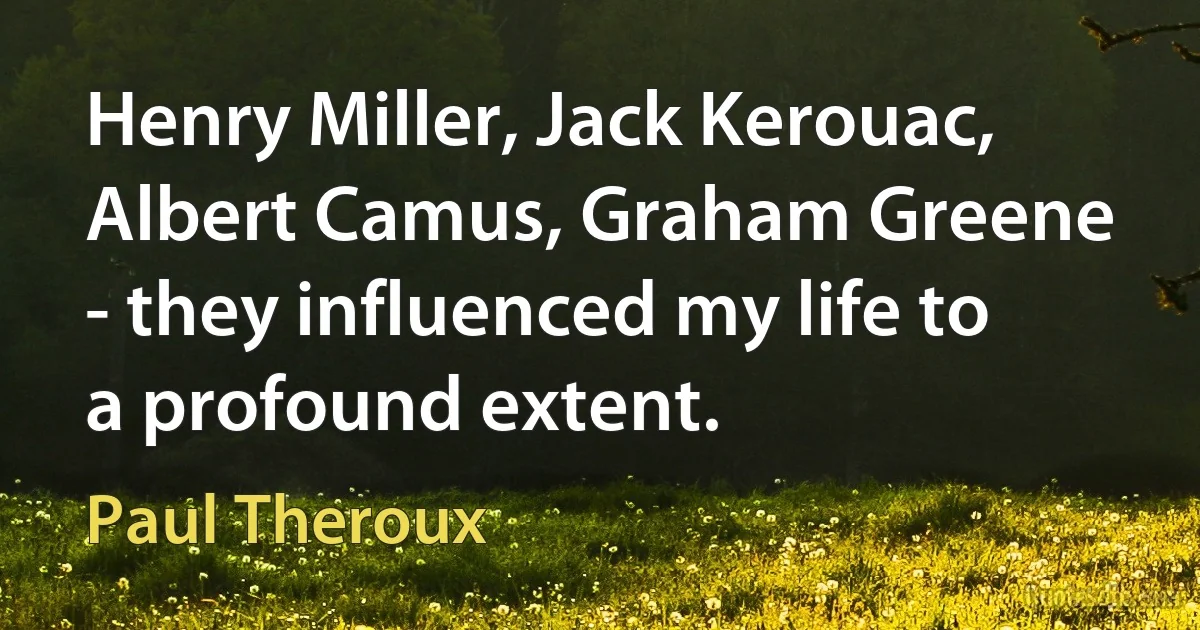Camus Quotes
Albert Camus, a great humanist and existentialist voice, pointed out that to commit to a just cause with no hope of success is absurd. But then, he also noted that not committing to a just cause is equally absurd. But only one choice offers the possibility for dignity. And dignity matters. Dignity matters.

David Simon
This book is about three Frenchmen who lived and wrote against the grain of these three ages of irresponsibility. They were very different men and would have been surprised to think of themselves as a group, yet they have something rather distinctive in common. All three played an important role in the France of their lifetime but lived at a slightly awkward tangent to their contemporaries. For much of his adult life each was an object of dislike, suspicion, contempt, or hatred for many of his peers and contemporaries; only at the end of their long lives were Léon Blum and Raymond Aron, for quite different reasons, able to relax into the comfort of near-universal admiration, respect, and, in some quarters, adulation. Camus, who had experienced all three by the age of thirty-five, died twelve years later an insecure and much-maligned figure; it would be thirty years before his reputation would recover.

Tony Judt
Camus [five_questions]said there is only really one serious philosophical question, which is whether or not to commit suicide. I think there are four or five serious philosophical questions:
The first one is: Who started it?
The second is: Are we going to make it?
The third is: Where are we going to put it?
The fourth is: Who's going to clean up?
And the fifth: Is it serious?

Alan Watts
Because the book became a freak 'bestseller', because I found myself bracketed with the 'Angry Young Men' of the period, I found myself carried to 'fame' on a wave of publicity -- only to discover that this kind of fame is one of the subtlest forms of obscurity. Everybody knew who I was, and nobody knew what I stood for. The public image meant that nobody was interested in what I had to say, for everyone was convinced that they already knew. I could talk until I was blue in the face about my attempt to revise the pessimistic existentialism of Heidegger, Camus and Sartre; as far as most people were concerned, I was an autodidact who was angry about something or other.

Colin Wilson
I could see clearly that this problem could only be solved on the individual and personal level; political revolt is irrelevant. Both Camus and Sartre had been neatly hog-tied by their earlier radicalism. Camus came to see that rebellion is a political roundabout that revolves back to the same old tyranny; too ashamed to admit that he had outgrown his leftism, he found himself in an intellectual cul-de-sac. Sartre accused Camus of being a reactionary; but he paid for his own refusal to reexamine his political convictions by congealing into a grotesque attitude of permanent indignation, shaking his fist at some abstract Authority. Where politics is concerned, he seemed determined to be guided by his emotions.

Colin Wilson
Writing stories was not easy. When they were turned into words, projects withered on the paper and ideas and images failed. How to reanimate them? Fortunately, the masters were there, teachers to learn from and examples to follow. Flaubert taught me that talent is unyielding discipline and long patience. Faulkner, that form – writing and structure – elevates or impoverishes subjects. Martorell, Cervantes, Dickens, Balzac, Tolstoy, Conrad, Thomas Mann, that scope and ambition are as important in a novel as stylistic dexterity and narrative strategy. Sartre, that words are acts, that a novel, a play, or an essay, engaged with the present moment and better options, can change the course of history. Camus and Orwell, that a literature stripped of morality is inhuman, and Malraux that heroism and the epic are as possible in the present as is the time of the Argonauts, the Odyssey, and the Iliad.

Mario Vargas Llosa
Rainer [protagonist in the novel], who is reading The Outsider by Camus, says he would like to put the hostility of the world behind him. Once your hope for something better is taken from you, then at last you have the present all in your hand. Then you yourself are reality. Others are extras. When Rainer contemplated san evening he says that evening is melancholy ceasefire where all life has come to and end.

Elfriede Jelinek
The principle behind the cinema, like that behind all the arts, rests on a choice. It is, in Camus' words, "the revolt of the artist against the real."
If one holds to this principle, what difference can it make by what means reality is revealed? Whether the author of a film seizes on the real in a novel, in a newspaper story or in his own imagination, what counts is the way he isolates it, stylizes it, makes it his own.

Michelangelo Antonioni
Albert Camus wrote that the only serious question is whether to kill yourself or not. Tom Robbins wrote that the only serious question is whether time has a beginning or an end. Camus clearly got up on the wrong side of the bed, and Robbins must have forgotten to set the alarm. There is only one serious question. And that question is: "Who knows how to make love stay?"

Tom Robbins
The shortage of public intellectuals (in the English-speaking world) goes back to the decline of the written media: the first TV intellectual was Foucault, who was at home in both media, but his successors and imitators know only the camera. This forces sound bites upon even the most complex material: see Schama, Ferguson e tutti quanti. Also, and paradoxically: public intellectuals are best when they are grounded in a particular language, culture, debate. Thus Camus was French, Habermas is German, Sen is Bengali, Orwell was deep English. This made their cross-frontier ventures plausible, in the same way that Havel or Michnik today have street cred because they started out as courageous dissidents in a very particular time and place. The opposite is the ridiculous Slavoj Zizek: a "global”' public intellectual who is therefore of no particular interest in any one place or on any one subject. If he is the future of public intellectuals, then they have no future.

Slavoj Žižek
Something about the fact that I made some contribution to either my country, or those who were less well off. I think back to what Camus wrote about the fact that perhaps this world is a world in which children suffer, but we can lessen the number of suffering children, and if you do not do this, then who will do this? I'd like to feel that I'd done something to lessen that suffering.

Robert F. Kennedy



